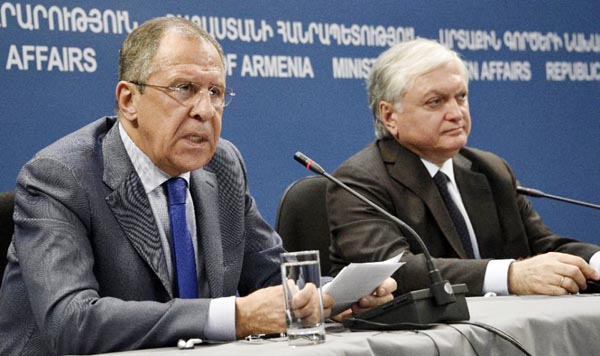
AP, Yerevan :
Russia’s foreign minister said Monday the next round of Syria talks expected to be held this weekend must not focus squarely on demands for Syrian President Bashar Assad’s resignation, which he called a “simplistic approach.”
Sergey Lavrov, speaking on a trip to Armenia, said the talks should focus instead on reaching consensus on who should represent the Syrian opposition and who should be considered extremists.
At the initial talks in Vienna on Oct. 30, the U.S., Russia, Iran and more than a dozen other nations agreed to launch a new peace effort involving Syria’s government and opposition groups. But they carefully avoided the issue of when Assad might leave power – a dispute at the heart of the nearly five-year-old conflict that has claimed more than 250,000 lives.
British Foreign Secretary Philip Hammond said there is “quite a lot going on” behind the scenes ahead of this weekend’s talks, and U.S. Secretary of State John Kerry “is highly active in trying to promote this process.” But Hammond stressed to reporters at U.N. headquarters in New York that no one should underestimate “the scale of the challenge.”
Hammond cited the “fundamental difference” between Britain, the U.S. and other countries that believe Assad must leave office as part of the transition process, and Syrian allies Russia and Iran “who believe that he should be able to take part in a future election and if that election decides that he should go, then he goes at that point.”
Lavrov said some participants in the initial round of Vienna talks have kept pushing for Assad to step down instead of focusing on who should participate in negotiations.
But Hammond said “we do not believe it is going to be possible to bring the opposition groups into the political process and have an effective cease-fire unless we have a clear point at which President Assad will depart at some point during the transitional process.”
Meanwhile, Russia announced Monday that it has agreed to push on with a deal to deliver S-300 missile systems to Iran after Moscow halted an earlier agreement due to UN sanctions slapped on Tehran.
“The contract between Russia and Iran for delivery of S-300 missile systems is back in force,” the state-run Russian Technologies corporation said in a statement, adding that the two sides had “signed a contract”.
Moscow in April lifted a ban on selling the missile systems to Iran, ahead of Tehran sealing a final historic deal with world powers in July to curb its nuclear programme. The decision sparked condemnation from Israel and concern from Washington, as it came before the lifting of the sanctions by the UN Security Council.
Russia argues that the missile system is exclusively defensive and does not even fall under the sanctions.
Moscow blocked deliveries of the surface-to-air missiles to Tehran in 2010 after the UN Security Council imposed the curbs on Iran over its nuclear programme barring hi-tech weapons sales.

